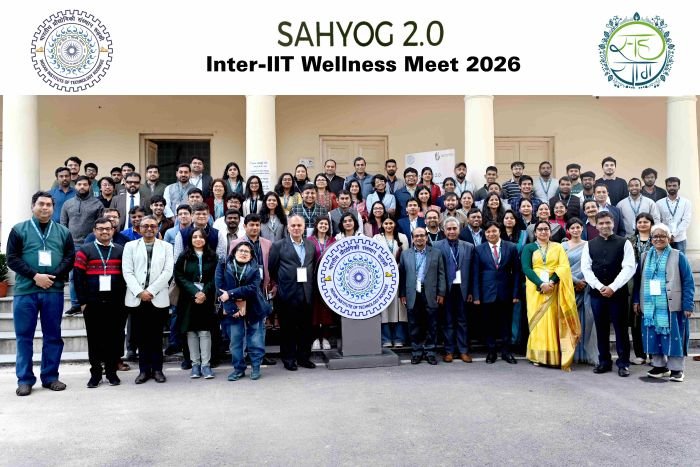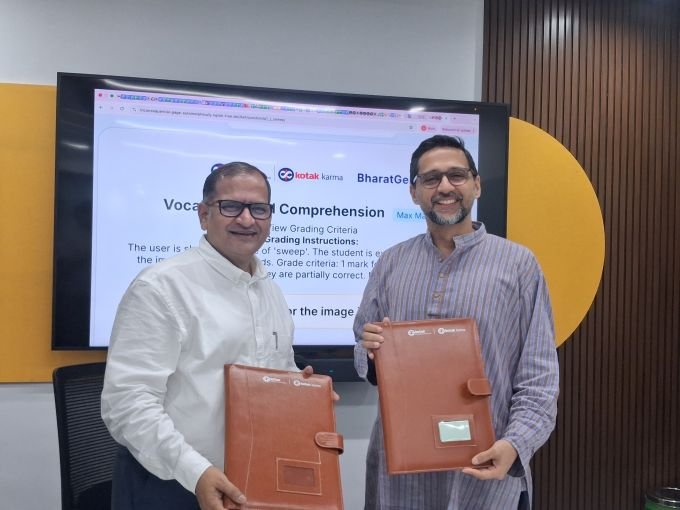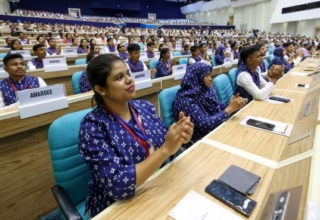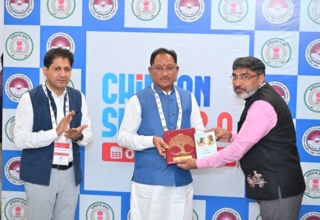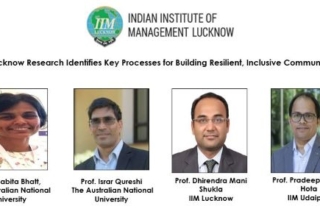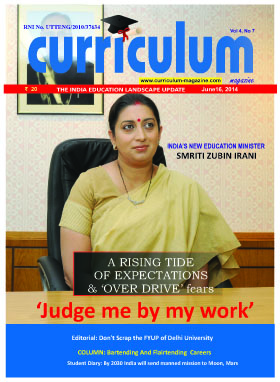
A Rising tide of EXPECTATIONS & ‘OVER DRIVES’
 Expect the new HRD minister, Smriti Irani to initiate several reform measures and go into an overdrive on the education front especially after her, “I will humbly request all of you that judge be my work” comment on her ministerial debut marred by controversy over her educational qualification. The first big ticket announcement of IIT, IIM for every state has already put a big question mark on her wisdom of piloting the reform-starved education sector in India. At the same time Prime Minister Narendra Modi’s wish to turn India into ‘skilled India’ is a welcome vision, which now must be backed wholeheartedly
Expect the new HRD minister, Smriti Irani to initiate several reform measures and go into an overdrive on the education front especially after her, “I will humbly request all of you that judge be my work” comment on her ministerial debut marred by controversy over her educational qualification. The first big ticket announcement of IIT, IIM for every state has already put a big question mark on her wisdom of piloting the reform-starved education sector in India. At the same time Prime Minister Narendra Modi’s wish to turn India into ‘skilled India’ is a welcome vision, which now must be backed wholeheartedly
IRONICALLY THE COLOSSAL neglect that the education reforms process has been subjected to in the last couple of decades and hoodwinked in the just concluded electioneering as an electoral issue, became a talking point with the appointment of the new HRD minister, Smriti Irani, by the newly elected BJP-led NDA government at the centre. Again, it were the educational qualification of the new minister and a discrepancy in her affidavits filed before the Election Commission in 2004 and 2014 that became an issue and the accompanying debate on the mess that India’s education system is, a by-product!
The controversy around her appointment started with the opposition Congress pointing out that country’s new education minister was not even a graduate and women rights activist and senior fellow at Delhi-based Centre of Developing Societies (CDS), Madhu Kishwar, attacking her on her lack of a proven track record and administrative cum poltical experience. In her opinion, which she tweeted, “The HRD ministry was a very “vital” ministry and that India’s education sector was in a mess and somebody with a vision was needed. HRD needs a head, who can steer dexterously between Left and Right extremists in academia to define sensible course unfettered by partisan agendas. The job requires handling chief ministers, because education is a state subject and also requires handling vice chancellors.” Columnist Pyarelal Raghavan writing in Times of India ( 29th may) wrote the choice of an ill-qualified minister with no familiarity in holding public office or administrative experience of running any large organisation as the minister for HRD is baffling. Providing effective leadership to such a crucial ministry requires a grasp of issues like improving the quality of education, but also of ways to restructure and or even reinvent the education system to match with the changing times. However in a counter view the newspaper writes, “That Irani is an outsider to higher education may even hold the ministry in good stead, as she may avoid some of its biases and have better perspective. She may, for example, have greater appreciation for distance learning and vocational education which are sorely needed in India.”
Another commentator writing about the Irani issue said, “PM has chosen a young and dynamic politician with a less than stellar academic track record for heading MHRD… She has not been associated with any academic activity thus far in addition to not having received College education. The choice should have generated a healthy debate in public domain focusing on what does the extent domain knowledge of a minister facilitate the functioning of any given ministry in general and HRD ministry in particular. In a democratic polity, every decision of a PM is open to public scrutiny. “
The new union HRD minister, a Miss India contestant of 1998, model, and television soap superstar, an alumnus of Holy Child Auxilium School. New Delhi and ‘Delhi University’ who joined politics in 2004 and contested unsuccessfully even in 2014 is seen as a confidante of the Prime Minister Narendra Modi, which is seen by many as an advantage for her to deliver while arguing that there have been ministers who have done remarkably well in the past without good educational qualifications.
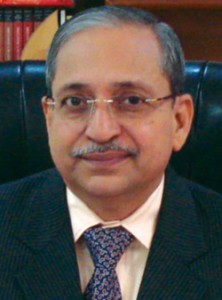 According to Dr H Chaturvedi, alternate president of Education Promotion Society for India, a national body of private higher educational institutions based in Delhi, the new minister is young, intelligent and close to top leadership in the government and that gives an optimism about her performance. “Though it is too early to say something but in contrast to a high headed person like Kapil Sibal, I think she being from the media and communications field can do better and get things moving,” he adds.
According to Dr H Chaturvedi, alternate president of Education Promotion Society for India, a national body of private higher educational institutions based in Delhi, the new minister is young, intelligent and close to top leadership in the government and that gives an optimism about her performance. “Though it is too early to say something but in contrast to a high headed person like Kapil Sibal, I think she being from the media and communications field can do better and get things moving,” he adds.
After assuming her office, Irani promised to increase public spending on education to 6% of GDP and review all legislations related to higher education reform that had lapsed with the dissolution of the 15th Lok Sabha. She also said that consensus would be the by-word in policy formulation. “On behalf of the ministry, we have undertaken a study of all the pending Bills in Parliament… all pros and cons of those legislation, and I will only say this instead of making .. . all pros and cons of those legislation, and I will only say this instead of making any specific statements right now, we are having ministerial meetings within our department to see what are the initiatives we need to undertake,” she told reporters on first day of her office.
According to newspaper reports the new HRD minister has given a list of 60 priority areas to her officials and asked them to work in that direction. The list is a mix of progressive initiatives, the Sangh Parivar’s ideas on education and the Gujarat model on teachers’ training. She also wants her ministry to give an assessment of Delhi University’s four-year undergraduate programme (FYUP), look into the possibility of setting up IITs in all states as well as Yale-Pan IIT network and map the best education practices in the country. With the revision due on National Curriculum Framework next year, Irani is also looking at promoting vedic education and a national association of parents.
Experts and academicians have expectations that the new minister will prove her critics wrong in coming months. “We definitely welcome her and hope she will have love for merit, quality higher education and dedicated professionals and work with commitment, dedication and honesty for country’s education system,” says Prof (Dr) Virendra Goswami, a scientist and academician. According to former long serving MHRD secretary B S Baswan, “ The license-permit raj in education must end and for the RTE, the dissenting SC judgment of Justice Radhakrishnan indicates the correct legal position.” According to president of the Delhi-based think tank, Centre for Education Growth & Research (CEGR) Jayashree Srivastava who is also t he managing director of Ishan Vidya Prep Pvt Ltd, “ What Indians really need at this moment is accessibility to quality education which includes infrastructure and the good teachers. I would hope that this combination is on her priority list.”
he managing director of Ishan Vidya Prep Pvt Ltd, “ What Indians really need at this moment is accessibility to quality education which includes infrastructure and the good teachers. I would hope that this combination is on her priority list.”
Chairman & Managing Director of Educomp Solutions , Shantanu Prakash, arguably the most successful pioneering modern generation edupreneur, who proved that education can also be made an industry and inspired hundreds of enterprises in last 15 years feels the new government should focus on democratizing education by allowing the private enterprise to energize the sector, usher in globally recognized courses and boost job creation. In words of Dr. Prashant Bhalla, Chancellor, Manav Rachna International University, “ In the education space too India must meet the globally accepted norm of central and state governments spending at least 6% of GDP on education rather than the roughly 4% that states and Centre put together spend currently. Ideally we should be aiming to double this figure, in tune with other countries. Development of skill-set should be in the priority list of the government. I hope the new government would emphasize on education reforms and support and encourage the private sector to play a much larger role in higher education.”
According to Navin Bhatia, “For 30 critical industry sectors across India there is need to create 1200 learner centric NOS(national occupational standard) aligned content which does not exist at all .For these 30 critical industry sectors across key district town in India in order to effectively assess and certify candidates nation needs 50,000 certified assessors which do not exist at all. In order to skill 240 lakh youth every year(youth which are entering job market every year) across key district &block towns nation needs 6,00,000 skilled &certified trainers across 30 sectors and 1200 courses which do not exist at all.”
If the BJP’s election manifesto is any indication, Irani will have to deliver a tall order from setting up an Education Commission in two year’s time possibly to be followed up with a new national education policy to address the growing clamor for extending RTE from 0-18 years, teacher shortages. To sum up in words of Vineet Gupta, co-founder of Ashoka University and managing director of Jamboree Education Pvt Ltd, the new government will have to give up a quantitative mindset for education initiatives to prosper and propel education demand in the country.
Also, the government and the new HRD must guard against any temptation to vitiate the near census on reform process much of which is articulated well in the BJP manifesto. There is a looming danger of Irani short-circuiting some futuristic reforms like Delhi University’s FYUP or restoring to ‘saffronization’ of text books in the name of moral education and worse ‘epical’ science. People have starting making a strong case for such a thing. According to François Gautier, editor in chief of the Paris-based La Revue de l’Inde and a director of a book collection on India with the same publisher, married to an Indian and also the trustee founder of FACT India, which does exhibitions and commissions films, who has spent considerable time in India and is known for his right-wing views, “ As a lover of Indian culture and spirituality, I am sometimes appalled at how westernized education is in India. I can only hope that the new Human Resources Minister will take-up the job to « Indianise, nationalise and spiritualise » education in India. Of course, she will be criticized by the secular media and intellectuals who will call it « a hidden Hindu agenda » she has already been attacked anyway, because she formed a committee to study the ancient literary works like the Upanishads and the Vedas and single out appropriate texts emphasizing the Hindu contribution to science, mathematics and philosophy. Reportedly, the officials have been asked to create study materials “encapsulating” the glories of the Hindu “golden age”. is they who upon getting independence, have denied India its true identity and borrowed blindly from the British education system, without trying to adapt it to the unique Indian mentality and psychology; and it is they who are refusing to accept « an Indianisation, nationalisation and spirtualisation » of India’s education system, which is totally western-oriented and is churning out machines learning by heart (Indian children must be amongst those having most homework in the world) boring academics which are of little usefulness in life. And what India is getting from this education is a youth which apes the West.”
Experts expression caution saying the greater principle remains, don’t poison the young minds, make them capable of learning to learn and they’ll explore and discover all lost knowledge treasures. Education is the biggest tool of social integration and transformation and a greater good.
Also, there is much work IITs and IIMs. There are already 16 IITs, with another being added in Seemandhra and North-east and 13 IIMs. The J & K Chief Minister in his tweet said it eloquently , “IITs & IIMs in every state is a terrible idea & will dilute these institutions. How about just making existing ones truly world class?” The states are crucial players in ensuring mass education is improved. Remaining fixed with central institutions won’t yield much to country, much of which is living beyond metro cities.
Coming weeks and months remain crucial in judging the new minister as the work is piled up from only nine months remaining for RTE Act final set of deadlines to host of legislative reforms lapsed in the last Lok Sabha and fueling creation of jobs.
Know Your HRD Minister
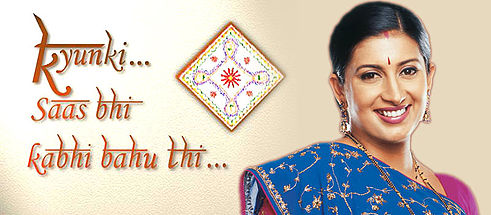 Smriti Zubin Irani, the 38-year old union human resources development (HRD) minister is the youngest cabinet minister in the present council of ministers. Born as Smriti Irani to to a cross-cultural family in Delhi, she was educated at Holy Child Auxilium, Delhi and School of Correspondence and Continuing Education, University of Delhi, Delhi. After a brief and not successful stint in modeling including though she became a 1997 Miss Indian contest finalist, she was a surprise choice for the main female lead in one of the longest running successful TV ‘Kyunki Saas bhi Kabhi Bahu Thi’ (July 3, 2000- November 6, 2008) sitcoms around a fictions Gujarati family by Balaji Telefilms on Star Plus channel where she played the role of an quintessential daughter-in-law. Her character, ‘Tulsi’ became a household name. She married to the estranged husband of model co-coordinator Mona Irani in 2001. Mid-way in the serial while her show was still on air, she joined BJP in 2003 and in 2004 Lok Sabha elections contested unsuccessfully from Chandni Chowk constituency in Delhi against Congress heavy weight Kapil Sibal. While she continued her artistic career holding record of winning five consecutive Indian Television Academy Awards for Best Actress (Popular), four Indian Telly Awards, eight Star Parivaar Awards and even ventured into TV production of her own, she continued with her political interests and engagements. She again fought elections unsuccessfully in 2009 from Chandni Chowk, but her rise in the BJP had already gathered momentum. A five-time national executive member of the party, she had various posts from Maharashtra state secretary, vice-president Youth Wing of the state, National Secretary, National President, B.J.P. Mahila Morcha and then National Vice-President, B.J.P. In August 2011, she was elected to Rajya Sabha from Gujarat and has ever since served on several committees. In the recent concluded elections, she gave a run for money to Congress Vice-president, Rahul Gandhi, in his family pocket borough of Amethi, from where she contested and reduced his winning margin to just above one lakh votes.
Smriti Zubin Irani, the 38-year old union human resources development (HRD) minister is the youngest cabinet minister in the present council of ministers. Born as Smriti Irani to to a cross-cultural family in Delhi, she was educated at Holy Child Auxilium, Delhi and School of Correspondence and Continuing Education, University of Delhi, Delhi. After a brief and not successful stint in modeling including though she became a 1997 Miss Indian contest finalist, she was a surprise choice for the main female lead in one of the longest running successful TV ‘Kyunki Saas bhi Kabhi Bahu Thi’ (July 3, 2000- November 6, 2008) sitcoms around a fictions Gujarati family by Balaji Telefilms on Star Plus channel where she played the role of an quintessential daughter-in-law. Her character, ‘Tulsi’ became a household name. She married to the estranged husband of model co-coordinator Mona Irani in 2001. Mid-way in the serial while her show was still on air, she joined BJP in 2003 and in 2004 Lok Sabha elections contested unsuccessfully from Chandni Chowk constituency in Delhi against Congress heavy weight Kapil Sibal. While she continued her artistic career holding record of winning five consecutive Indian Television Academy Awards for Best Actress (Popular), four Indian Telly Awards, eight Star Parivaar Awards and even ventured into TV production of her own, she continued with her political interests and engagements. She again fought elections unsuccessfully in 2009 from Chandni Chowk, but her rise in the BJP had already gathered momentum. A five-time national executive member of the party, she had various posts from Maharashtra state secretary, vice-president Youth Wing of the state, National Secretary, National President, B.J.P. Mahila Morcha and then National Vice-President, B.J.P. In August 2011, she was elected to Rajya Sabha from Gujarat and has ever since served on several committees. In the recent concluded elections, she gave a run for money to Congress Vice-president, Rahul Gandhi, in his family pocket borough of Amethi, from where she contested and reduced his winning margin to just above one lakh votes.
She was also a goodwill ambassador to India by USAID for the WHO-ORS program for 3 years and runs her own NGO ‘People For Change’ (esb 2007) through which she does social work in rural Maharashtra.
Abridged ver of letter by RTE Forum’s convener, Ambarish
Rai
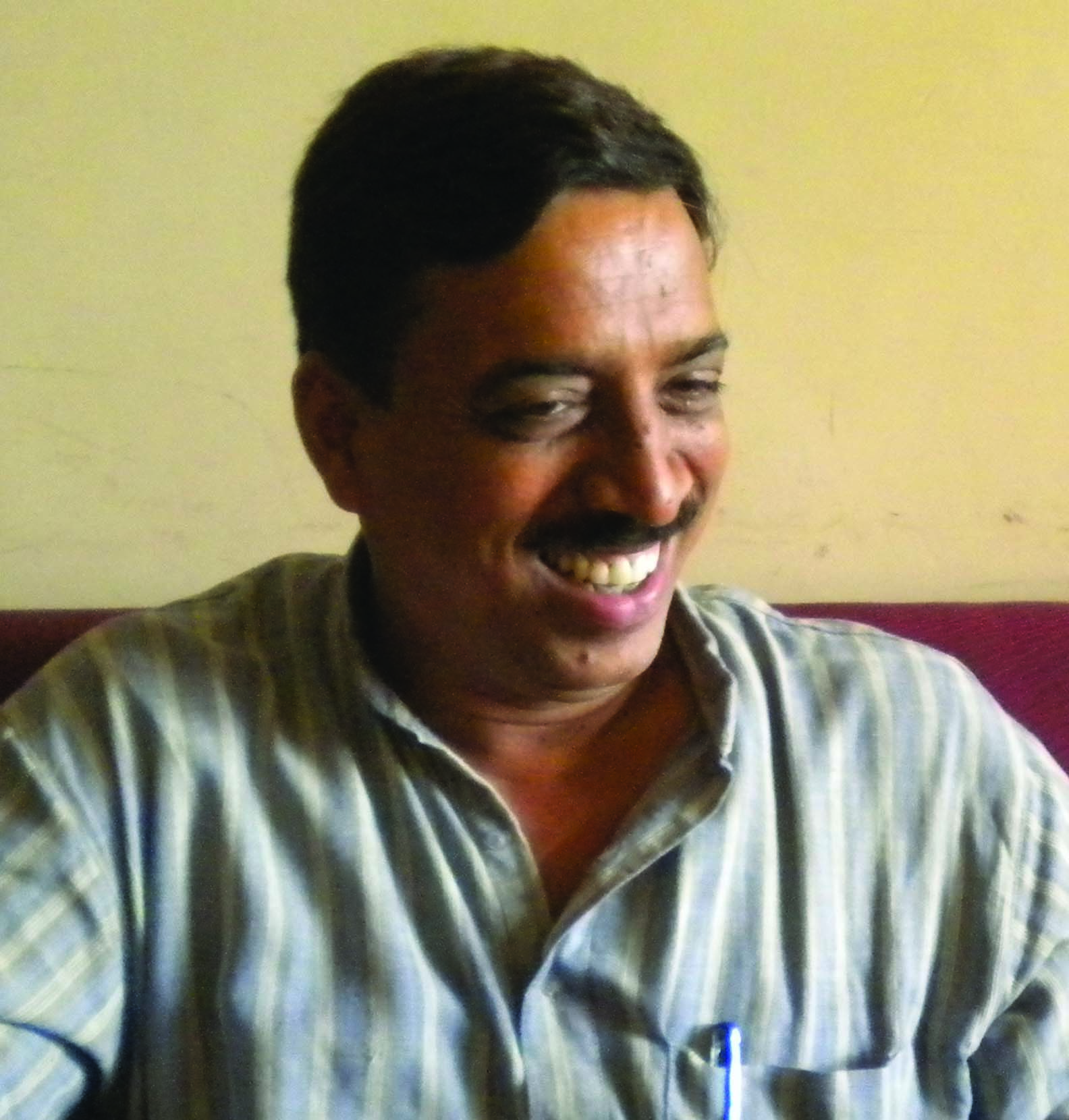 It s a matter of grave concern that even after 4 years; the RTE Act continues to default on almost all the deadlines set by the Parliament.The next and final set of deadlines is March, 2015, whereby all teachers have to be professionally trained and regularised. However, as evident from the field, no mechanism has been evolved to ensure appropriate and adequate training of teachers.
It s a matter of grave concern that even after 4 years; the RTE Act continues to default on almost all the deadlines set by the Parliament.The next and final set of deadlines is March, 2015, whereby all teachers have to be professionally trained and regularised. However, as evident from the field, no mechanism has been evolved to ensure appropriate and adequate training of teachers.
Inadequate spending on education, inability of the state to provide basic amenities like functional toilets separate for girls and safe drinking water, lack of trained teachers, ineffective grievance redressal mechanism are some of the persistent problems which require immediate attention. We are also deeply concerned with the poor quality of education in government run schools and increasing drop-out rates.
Complete implementation of the RTE Act, 2009. Ensure all habitations, especially those of marginalized groups, are covered by a school that is compliant with all the norms of RTE- including infrastructure and recruitment of professionally qualified teachers to ensure appropriate pupil teacher ratio (PTR). All teacher vacancies are filled by professionally qualified teacher.
Increase the spending on education to 6% of GDP and ensure that the funds allotted are actually spent. (There has been a steady decline in % GDP for education from 3.65 (2009-10) to 3.31 (2012-13). Only 61% of SSA budget allotted has been spent
Put in place rational regulatory framework for private schools including compliance with minimum norms
Strengthen NCPCR/ SCPCRs by making them functionally independent, adequately staffed and financed entities and put in place an uninterrupted chain of redress of complaints from the grassroots to national level fees, implementation of RTE quota. (A clearly defined mechanism for addressing complaints can serve as a bottom up process of reforming the system)
Empower parents to exercise control over their schools- ensure bottom up planning that forms the basis for allocations, implement DoPT circular for proactive disclosure under RTI and roll out a process of social audit in all schools
Put in place a convergence mechanism between all ministries implementing education programmes(MHRD, MWCD, Social Justice, Tribal, Health, Water and Sanitation, Ministry of Minority Affairs, Ministry of Law and Justice) to ensure implementation of RTE
Institutionalize fully functional, adequately staffed and financed academic support structures for teachers- CRCs, BRCs, DIETS- in all states. Without improving all above quality of education cannot be ensured.
(Currently 80% of teacher training institutions are private, and teachers emerging from this system have a barely 10% pass percentage in the national teacher eligibility test. Better pre-service and in-service teacher training and school based support systems are needed to get the best outcomes)
Implement pay parity of teachers- 6th pay commission across all teachers
(Over a tenth of teachers in India are on short term contract, a percentage that has increased in 23 states. Massive variations in pay scales also exist for teachers due to variations in the pay scales of permanent as against contract teachers- the principle of equal work, equal pay needs to be adhered to)
Steps need to be taken to ensure end of discrimination and total inclusion of Children with disability, Dalit, Tribal and Muslim learners in classrooms. Existing provisions in this regard need to be implemented. Special focus needed to ensure gender sensitive schooling, especially at the Upper Primary stage
Put in place policies and resources to ensure instruction in the mother tongue for all children from tribal background, migrants and Urdu speakers in the early grades
(Children speaking local languages/ dialects are often unable to understand the spoken language in classroom, especially immediately after admission. This needs to be addressed through ensuring availability of adequate number of teachers able to speak in the children’s mother tongue and supply of materials in the same. These alternatives should, however, not be of a lower quality
Bring all children back into school by 2015- roll out nationwide child mapping and tracking systems, special training for all children out of school and ensure that budget allocations for the same are adequate



